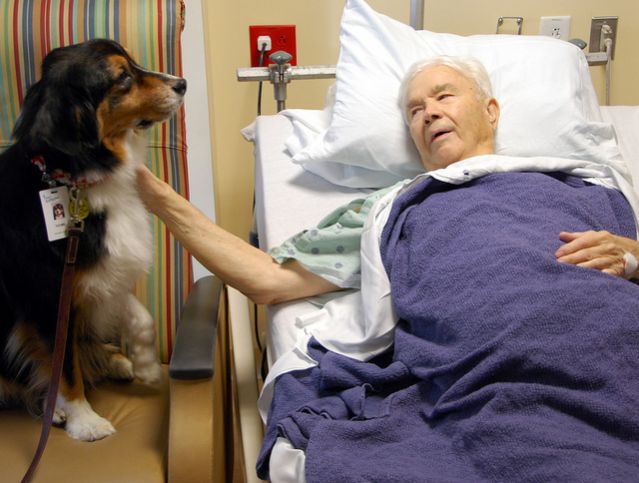Intelligence
Can Therapy Dogs Help Cure Cancer?
A new study about the effects of therapy dogs on cancer patients
Posted February 5, 2015

For dog lovers, it is obvious that canine companions bring comfort during times of stress. Therapy dogs are already a fixture in many hospitals, nursing homes, service agencies, and other settings where people are in need of emotional support. Psychologists who study animal-assisted therapy recognize that dogs offer something that even the best intentioned human caregiver can't quite match—namely they give unconditional love. Dogs don't judge you, try to give you advice, offer platitudes, or try to tell you their own stories. Instead dogs offer simple comfort to people who are facing frightening circumstances which they feel may be out of their control. However, scientists are not comfortable with anecdotal reports and simple observation, but rather need well controlled experimental measurements to determine effects to convince them of the usefulness of something like a therapy dog.
A carefully structured new study of the effects that dogs have on people who are severely ill and suffering from cancer has been reported in the Journal of Community and Supportive Oncology.* The study was headed by Stewart Fleishman and was conducted at Beth Israel Medical Center in New York City. "We wanted to really test animal-assisted therapy and quantify the effects," he explained. The subject sample which the research team chose were people who were really quite ill, namely 37 patients at the hospital who were undergoing six weeks of chemotherapy and radiation treatment for head and neck cancers, mostly affecting the mouth and throat.
All of the patients who participated in the study agreed to have visits with a therapy dog immediately before each of their treatment sessions. The dogs were registered therapy dogs trained by the Good Dog Foundation. The therapy dogs were brought into the waiting room or hospital room so that the patients could spend about 15 minutes with them right before each bout of treatment began.
One of the key factors in this particular study is that the form of cancer which these patients are being treated for is nasty and painful. However, as Fleishman described it, the chemical and radiation regime that they are undergoing were also "intense." In other words, although the patients are in bad shape to begin with, during the course of the treatment they are expected to feel even worse. Fleishman described this by saying, "These patients get very sick, they can't eat well, they have trouble speaking. The treatment becomes more of a burden than the cancer."
A number of measures were taken on the patients when they first arrived to begin treatment, halfway through the six week program, and then at the end of treatment. The idea was to measure their physical well-being, how well they were functioning, and their emotional and social well-being. As we've already seen the chemical and radiation treatments are aggressive and have major side effects. During the course of treatment the patients were extremely fatigued, they were also frightened and lost weight vital to maintain their strength. Many had feeding tubes, lots of mucus in the mouth and throat and temporarily lost their senses of smell and taste. Given those results, as expected the measures of physical well-being and functioning went down significantly during the treatment regime. However, the emotional and social well-being of the patients actually went up contrary to what usually happens to what usually happens to similar patients who do not experience contact with a therapy dog.
So, can dogs help cure cancer? Well, according to Dr. Fleishman, "One patient said, 'I would've stopped the treatment, but I wanted to come see the dog. '" In other words, it was the presence of a therapy dog that brought the patient back, and encouraged him to continue to take the potentially lifesaving, but highly unpleasant treatments. Fleishman sums up his results by noting, "It takes time, effort, and money for animal-assisted therapy to happen, and this data based study offers evidence that it's all worth it." Thus when it comes to cancer treatment, these new findings show that the rigors of the required clinical process can be lessened. "I think patients can take heart, since there are interventions that can make the quality of that time better," he concluded. And that intervention is a therapy dog.
Stanley Coren is the author of many books including: The Wisdom of Dogs; Do Dogs Dream? Born to Bark; The Modern Dog; Why Do Dogs Have Wet Noses? The Pawprints of History; How Dogs Think; How To Speak Dog; Why We Love the Dogs We Do; What Do Dogs Know? The Intelligence of Dogs; Why Does My Dog Act That Way? Understanding Dogs for Dummies; Sleep Thieves; The Left-hander Syndrome
Copyright SC Psychological Enterprises Ltd. May not be reprinted or reposted without permission
* Data From: Stewart B Fleishman, Peter Homel, Maurice R Chen, Victoria Rosenwald, Victoria Abolencia, Juliet Gerber, & Sanjay Nadesan (2015). Beneficial effects of animal-assisted visits on quality of life during multimodal radiation-chemotherapy regimens. Journal of Community and Supportive Oncology, 13 (1), 22-26.


